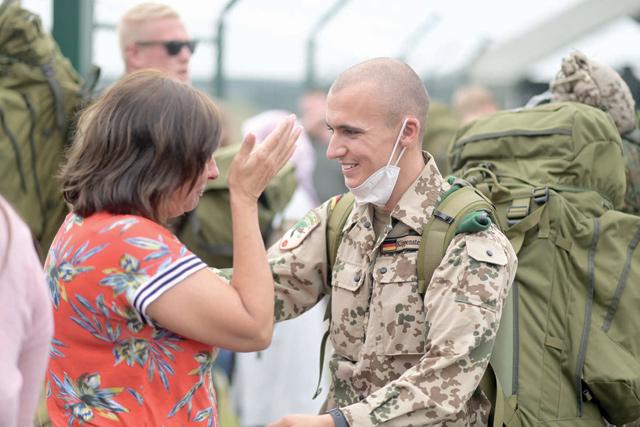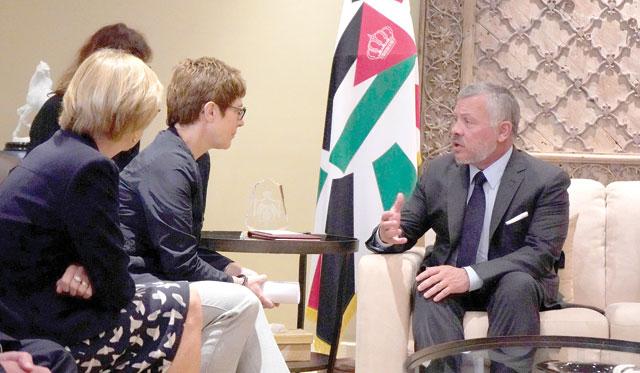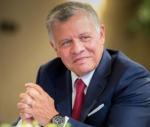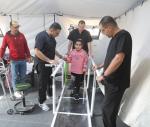You are here
NATO holds post-Trump talks as Afghanistan decision looms
By AFP - Feb 17,2021 - Last updated at Feb 17,2021

In this file photo, US Secretary of Defence Lloyd Austin speaks during a visit by US President Joe Biden to the Pentagon in Washington, DC, February 10 (AFP photo)
BRUSSELS — NATO defence ministers met on Wednesday for their first talks since US President Joe Biden took office, looking to reboot ties after four years of tensions under Donald Trump.
Key on the agenda at the two-day virtual conference is the future of NATO's 9,600-strong support mission in Afghanistan after Trump sidelined allies and struck a deal with the Taliban to pull out troops.
Biden's administration is reviewing whether to stick to a looming May 1 deadline to withdraw or risk a bloody backlash from the insurgents by staying.
New US Defence Secretary Lloyd Austin is not set to make any firm announcement when the topic is discussed on Thursday — but will seek input from allies to help Biden make his call.
Other NATO members insist they are willing to remain in Afghanistan, if Washington stays too.
“We can already say that we are not yet in a position to talk about the withdrawal of international forces from Afghanistan,” German Defence Minister Annegret Kramp-Karrenbauer said as she arrived for the meeting.
Central to the mission’s fate is the question of whether the US determines that the Taliban has broken promises in the peace deal by ratcheting up attacks and failing to make headway in talks with the Kabul government.
The insurgents have launched a string of offensives threatening at least two provincial capitals and warned NATO ministers not to seek a “continuation of occupation and war” by staying.
Kramp-Karrenbauer said peace negotiations between the Taliban and government “have not yet been concluded in such a way that the troops can now leave Afghanistan”.
“This also means a changed security situation, an increased threat for the international forces, also for our own forces. We have to prepare for this, and we will certainly discuss this,” she said.
NATO countries are desperate not to see Afghanistan slide back into serving as a sanctuary for groups like Al Qaeda, two decades after the alliance launched operations there in the wake of the September 11 attacks.
“This war is not winnable, but NATO cannot allow itself to lose it pitifully,” a European diplomat said.
A study mandated by the US Congress has called for a delay in the pullout, warning it would effectively hand the Taliban a victory.
Trump cut US troop numbers during his final days in office to 2,500 — their lowest figure since the start of the war in 2001.
‘Important messages’
The US wants to use this week’s meeting to draw a line under Trump’s tenure — during which the former leader reportedly discussed pulling out of NATO — by stressing Washington’s commitment to its partners.
“My message will be clear: we must consult together, decide together and act together,” Defence Secretary Austin tweeted.
“I’m a firm believer that the US is strongest when it works as part of a team.”
Austin will look to paper over any divisions, but a raft of challenges remain, including bolstering defence budgets and squabbles with NATO member Turkey.
The allies on Thursday are set to agree to extend and expand a training mission to bolster Iraq’s military as it tries to stop the resurgence of the Daesh group.
Diplomats said the deployment could increase from around 500 to up to 5,000 personnel and move beyond the capital Baghdad.
Wednesday’s discussions cover ambitious proposals to reform the 70-year-old alliance being prepared ahead of a summit to include Biden later this year.
NATO Secretary General Jens Stoltenberg is asking to increase NATO funding for “deterrence and defence activities” as NATO faces off against an emboldened Russia on its eastern flank.
That proposal comes after allies have faced years of combustible debate over defence budgets.
Trump harangued leading nations like Germany for failing to pull their weight as he pressured them to boost defence spending to 2 per cent of gross domestic product.
Despite the marked change in tone, the new US administration looks set to remain firm on pressing other members to do more to share NATO’s financial and military burden.
“Burden-sharing writ large is not going away and it’s going to remain a priority,” a senior US official said.
Related Articles
BERLIN — Germany has completed its troop pull-out from Afghanistan, started in May, the defence ministry announced on Tuesday, ending a near
AMMAN — His Majesty King Abdullah on Monday received German Federal Minister of Defence Annegret Kramp-Karrenbauer to discuss bolstering the
BRUSSELS — NATO Secretary General Jens Stoltenberg said Monday the alliance will not withdraw its troops from Afghanistan "before the time i

















